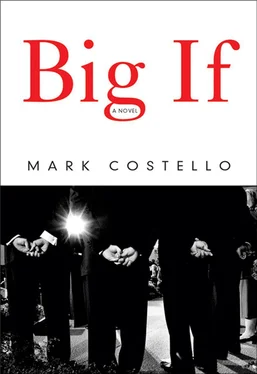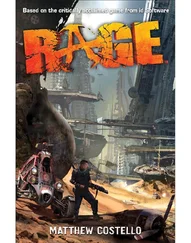Kai slid off the bed and ran for the door. Jens caught him and returned him, kicking, to the bed. Jens was never sure what to do or say when Kai made a break for it. What was the caring parent’s counterthreat? Have a time-out or else you’ll have a time-out? Did they really expect Kai to lie in the dark and think, this is what happens if you don’t lie in the dark?
Jens said, “Kai Kai Kai. This is a time-out.”
They had rules. Don’t lie — this was a rule. Pretending is okay, but we never lie. We don’t bite or hit or spit. We share and use our words. They were trying to communicate a moral world. Jens did not feel up to it some days. He looked at Kai, still sobbing on the bed. Something was missing. The boy deserved a lesson, a teaching, a rule for the future.
Jens said, “Son, we don’t throw our sponges at the fridge.”
Jens went to the dining nook, copied SmoShadow to a disk, and packed the laptop in a shoulder bag. SmoShadow was still buggy. Jens would have to clear the error flags before his morning meeting. He expected a rough meeting even with SmoShadow totally debugged; without it, he’d be dead. Jens was as that moment six weeks overdue on his last assigned project, not SmoShadow (SmoShadow was his own idea), but rather a new-series software bot, known around the company as Project Todd. Like all the monsters Jens had written for BigIf, Todd had come to him as a set of specs from the head creative, the game’s chief imagineer. The specs for Monster Todd were simple on the surface, a knock-off of the target-and-attack algorithms Jens had written for prior wildly popular monsters, Hamsterman, Skitz the Cat, Farty Pup, and Seeing Eye. Jens knew that the corporate planners at BigIf considered Project Todd a high priority, a crucial counterstroke to bolster BigIf’s stagnant market share.
Jens hadn’t understood what was new or special about Todd until he saw the rough-up of the monster on the screen of Phoebe Rosenthal, their artist in residence. The other monsters Jens had helped develop for BigIf were preposterous, cartoonish. Hamsterman, with his saucy killer twinkle, looked no more like a hamster than Bugs Bunny looked like a pellet-chewing rabbit in a hutch. It was comfortable to Jens, this distance from reality. Phoebe’s sketch of Todd, in contrast, was a boy of fifteen, slouchy, acned, callow, carrying a backpack like any skateboard kid in downtown C.E., like a million kids who played the game. There was something in this business of making monsters real or realistic which filled Jens with a deep sense of unease, as if the game were poised to cross some kind of line. He found it hard to concentrate on the code for Todd, simple though it was or should have been. His inability to finish the assignment was like a head cold which descended every time he clicked his buffers and opened a draft of Monster Todd. Jens had surrendered in frustration, turning to a program he liked working on, a problem he enjoyed, a nice bright piece of value-neutral engineering, SmoShadow.exe. He would show the shadow to his bosses at the morning meeting when they asked what he had been doing for the last six weeks.
Jens went down the flagstone walk, keys between his teeth, Kai riding on his hip carrying a peeled banana like a torch to light the way. They got in the car. Jens pulled around Bluffs Circle, waiting for a break in traffic on 1A. Kai was in his crash seat, singing to himself. Jens saw a gap and gunned it, heading up the shore to a chorus of car horns. Time was definitely in again.
Jens heard a yawn.
“Kai is tired, Poppa.”
Jens slugged Glucola as he drove. Lobstermen plowed rows along the shore. Gulls attacked a Chinese restaurant dumpster, wings pumping, drifting backwards in the wind. Gypsum ships waited at the head of Portsmouth Channel, three miles out. It was clear enough to see their rust.
“Hey buddy, see the gulls?”
“Where?” said Kai.
“Right there. They’re flying backwards, man. Isn’t that crazy?”
Kai tried to turn and look in his harness. He said, “Where?”
“Back there. We’ll look for them tomorrow.”
Jens pointed out the sights as drove his son to school. He did this to pass the time, and keep Kai awake, and because Walter Asplund had done it long ago, pointing out the sights, and Jens remembered being happy in those days. After a winter storm, there were many things to see: flooded parking lots, stop signs sheared and headless, tree limbs down along the road. Today there was nothing but houses, motels, condo courts, gulls, and lobster boats, and the big ships waiting for a river pilot in the gulf. Jens liked driving up 1A — you always knew what was coming next. This was home to Jens, the commercial coastline of his boyhood, a dial tone for the eyes.
He explained about the gypsum ships and the river pilots.
Kai didn’t understand. “Why do ships need pilots?”
“Because the port is rocky and the Piscataqua’s fast. It’s tricky getting in there, son. Your grampa used to do a lot of accidents in there.”
“Do they fly into the port?”
“The gypsum ships? ’Course not. That’s why they need pilots.”
Jens pulled into the gravel lot at Li’l People and walked Kai up the handicapped ramp.
Li’l People Montessori was three years old, a mecca for new money on the shore. Tuition for pre-K was like another mortgage, but the parents paid it happily. It was a lovely school. The classrooms were sunny and open-plan. Up the stairs was music, gym, and napping mats. The coatroom was a daily scene. Mothers and a few stray dads brokered playdates and babbled last instructions to their well-dressed heirs. One kid was always finishing his muffin by the door, one kid was always screaming, at least one kid, but never Kai. He found his cubby, shed his jacket to the floor.
Jens said, “Have a good day, Kaiyawatha.”
Kai was marching off. Jens followed at a distance, watching from the parents-and-caregivers’ observation area, a red batter’s box painted on the floor behind a half partition and the hanging spider plants. The children were already busy, one group making dolls from socks, another pounding clay, a third group on the pillows getting a story from the teacher’s helper, a high school girl in baggy flame-retardant-looking pants. Kai stood unnoticed in the center of the room, rocking in his pudgy sneakers, double-jointed at the knees, no ass whatsoever, and he was just fine, a total individual, alone in the universe. Jens was proudly terrified. The teacher would spot Kai in a moment, guide him to a group, and that would also be just fine, but until then Kai rocked and asked his little questions. Why do gulls fly backwards? Why do ships need pilots? Why is music up the stairs? Why is music? Why is Kai?

The old house on Santasket Road was set back in the trees,neat-looking and well-kept, a sign hammered in the lawn, Another offering by MOSS PROPERTIES. Jens pulled into the driveway, cut the engine, and got out.
The house had been on the market since September, asking the low threes, which seemed like quite a lot to Jens for a nothing sort of saltbox in a humdrum part of town, but also not enough for the first place he remembered knowing well. Peta was a broker at Moss Properties, of course, but she was a mansion specialist and this house, four bedrooms on a quarter acre, was well below the bottom of her market bracket. She had farmed it out to her secretary, Claus, a purring German boy working toward promotion as a junior sales associate. Claus had arranged for regular landscaping, a paint job in November (gray, the shutters white), leaving Jens to check the place once a week, the pipes and pumps and lawn, a job he had no time for, a duty he resented, although he seemed to come out more than once a week, often for no reason, just to stand here and look up at the trees.
Читать дальше













